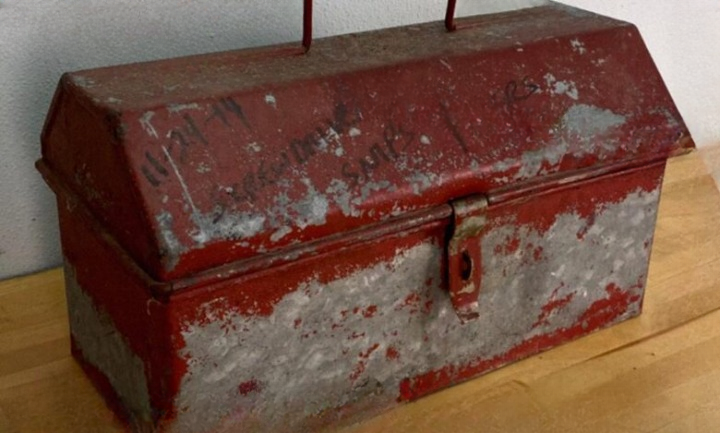A few days after my father’s funeral, April — my stepmother — appeared at my door with that too-perfect smile that always spelled trouble.
My mother had died when I was two. Or so my father said. April came into my life when I was ten, trying to play the part of mother. Too polished. Too forced. Like she was auditioning for a role she’d never really earn.
She stepped in without waiting for an invitation, immediately eyeing the rusty blue toolbox by my front door.
“Marla, honey,” she cooed, “that old thing will ruin your carpet. You should throw it out.”
I frowned. “Dad left it to me in his will. There must be a reason.”
April’s smile widened unnaturally. “Tell you what — I’ll give you $5,000 if you throw it away.”
I blinked. “Five grand? For that?”
“Just a gesture,” she said, slipping an envelope from her purse. “You got the short end of the stick, and I feel bad.”
Something didn’t sit right. April had never been generous — not once. She wanted that toolbox gone badly.
“Thanks, but I’ll keep it,” I said.
For the first time, her mask faltered. Panic flickered across her face, raw and brief, before she smoothed it over. “Suit yourself,” she said, tight-lipped. “It’s not like you have the key anyway. Your father lost it years ago.”
A lie that was too perfect, too ready.
The moment she left, I sat beside the toolbox, staring at the rusted lock. What could possibly be inside worth five thousand dollars to hide?
The next morning, I tried everything — bolt cutters, hammer, even a bobby pin. Nothing. The lock held firm.
Then it struck me — if my father really lost the key, how did April know the brand?
I decided to pay her a visit.
“April,” I said casually over the phone, “I’ve been thinking about your offer. Maybe I’ll take you up on it. Can I come by and look through Dad’s things?”
Her tone brightened immediately. “Of course! Tea this afternoon.”
That afternoon, she welcomed me with her usual fake warmth. While she prattled on about old belongings, my mind raced upstairs, toward her bedroom and the jewelry box she always kept hidden.
Halfway through tea, I excused myself. “I’ll be right back.”
There it was — nestled on her dresser. My hands trembled as I opened it. Inside, among pearls and earrings, lay a small silver key — the exact brand for the toolbox.
Bingo.
I pocketed it, returned to the living room, pretending to mull over a pair of cufflinks. “This is a big decision,” I said lightly.
“Of course, honey,” April said, still smiling.
Back home, I slid the key into the toolbox. The lock turned smoothly.
Inside were tools — screwdrivers, wrenches, a flashlight. Worthless in themselves. But beneath the tray, my hand brushed something flat, wrapped in plastic. An envelope. Legal papers. Divorce documents between my father and a woman named Susannah — my mother.
My throat went dry. My mother hadn’t died when I was two. She’d divorced my father. All those years, April had helped him keep it hidden.
I didn’t think. I drove straight to her house. April’s color drained when she saw the key.
“You opened it,” she whispered.
“And found the truth. Why lie?”
“He made me promise,” she stammered. “It was for your own good. Your mother… she wasn’t well. She thought you weren’t real. Eventually, he divorced her.”
“So he told me she was dead? And you went along with it?”
She didn’t answer. I didn’t need one. I turned and walked away.
Over the next three days, I dug through public records and news archives. My mother had died the previous year. Too late to reclaim what was lost.
I found her grave and knelt before it. “I’m so sorry,” I whispered. “I wish I’d known you. I wish I’d had the choice.”
Footsteps approached. An older woman froze before me. “Marla?” she said. “You… you look just like Susannah.”
Tanya. My aunt. My mother’s sister.
Through tears, she told me stories my father never would. My mother had loved me, despite everything.
I couldn’t bring her back. But in finding Tanya, I found a piece of my mother — and a piece of myself. Proof that love and truth survive, even through the deepest lies.
